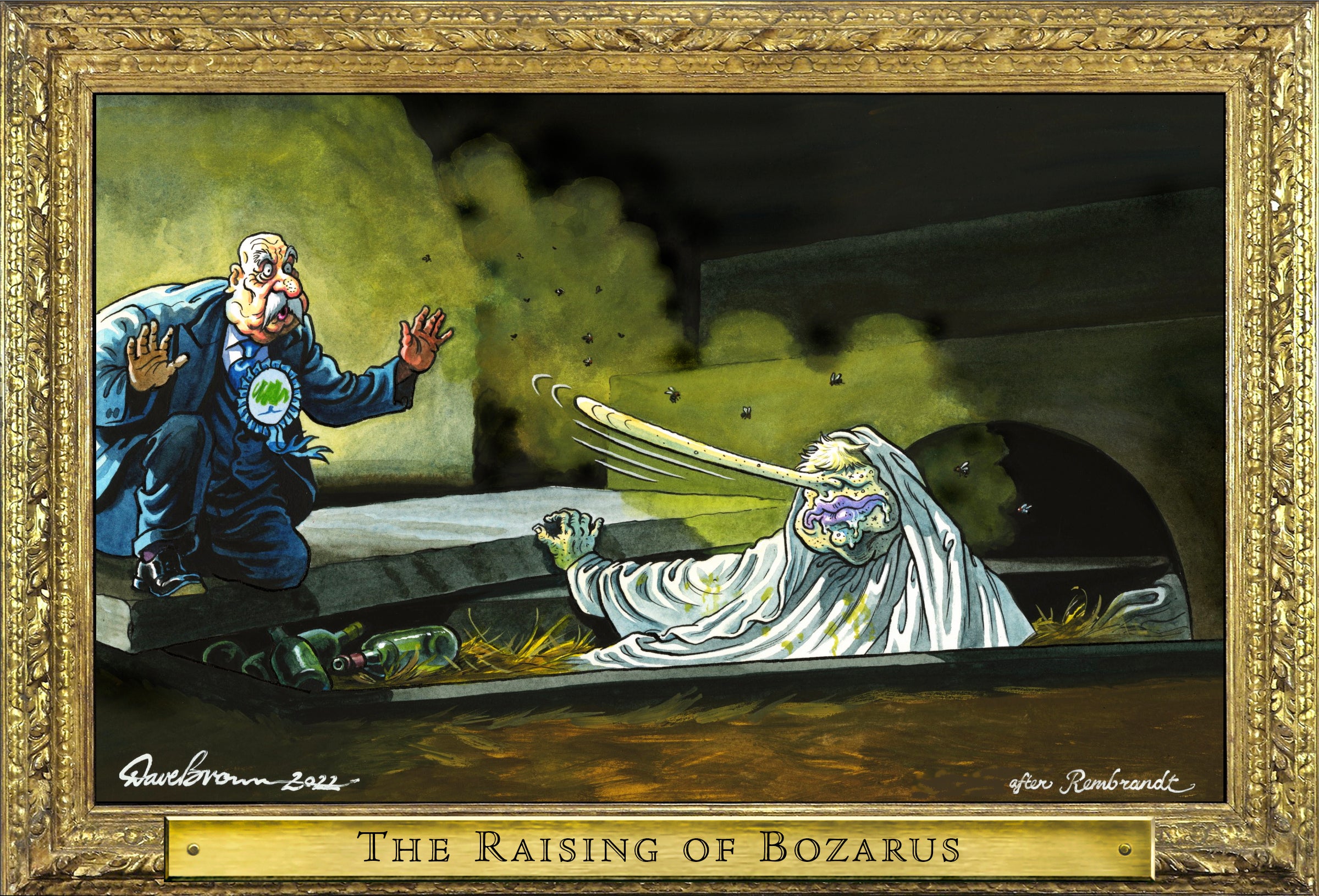Before the former prime minister has even declared his candidacy for the greatest comeback since Lazarus, the Conservative leadership election has already turned into a referendum on Boris Johnson.
Rishi Sunak and Penny Mordaunt, his most likely opponents, have been relegated to mere spear-carriers in the latest act in the drama that is the rise, fall, and possibly rise again of Mr Johnson. Ms Mordaunt’s declared candidature and pitch as a truly “fresh start” is bad news for Mr Johnson, as she may well cannibalise some of his natural support. But Mr Johnson has his following in the Commons, and he should never be underestimated.
Can he win? Should he win? Those are very different questions, though both are fairly easy to answer. If Mr Johnson makes it onto the electronic ballot that will go to the party membership, there seems little doubt that he will win and return to Downing Street. Even during the last leadership contest, there were petitions, grassroots organisations attempting to get the former leader onto the ballot papers, and talk of legal attempts to force him into the process (though Mr Johnson himself didn’t evince much enthusiasm for such a scrap).
His support within the voluntary wing of the party is sometimes exaggerated, but there are many card-carrying Conservatives who think Mr Johnson did nothing wrong during Partygate, or indeed during any other of the myriad scandals he got himself tangled up in, that in the end proved too much for his ministerial colleagues to tolerate.
Mr Johnson enjoys cult status among his followers, and they think only of the Brexity glories of the 2016 EU referendum and the general election of 2019 when they hear his name. Thus their loathing of Sunak is intense and impervious to reason. Their belief is that the former chancellor stabbed Mr Johnson in the back, and that this earlier “coup” was conceived and abetted by a coalition of embittered parliamentary colleagues, the mainstream media, the amorphous Remoaner “blob”, and in some minds, the European Commission in Brussels. It is a myth, and a dangerous one, but it is virulent among the selectorate about to send Mr Johnson back to No 10.
This, of course, is precisely why Mr Johnson shouldn’t win this election – because his victory will be based on a lethal cocktail of myth, wishful thinking, and nostalgia for the recent past. He did win a mandate for his party in 2019, but the world has changed much since then, and politics has been transformed.
Events have dissipated the strength of the majority he won, and before long, if Mr Johnson is returned to power, a combination of defections, renunciations of the whip, resignations and by-elections will also erode the Conservatives’ formal majority in the Commons down to minority administration status. Mr Johnson, like anyone else, will need a fresh mandate for policies that are nowhere to be found in the 2019 manifesto.
To keep up to speed with all the latest opinions and comment, sign up to our free weekly Voices Dispatches newsletter by clicking here
Mr Johnson has been a fine campaigner, but his electoral triumphs were also a product of the Brexit phenomenon (with much of the heavy lifting already done by Nigel Farage). He was also greatly assisted by the complacency of David Cameron in 2016, and by the manifest unelectability of Jeremy Corbyn in 2019.
Now, though, Brexit is “done”, at least formally, and Mr Corbyn isn’t even a member of the parliamentary Labour Party. Mr Johnson, contrary to myth, wasn’t a very popular leader with the public by the end of his time in office, and Partygate rightly outraged the nation. None of that has changed. He is just as unfit for office as he ever was. He may claim that the culture of Downing Street will change, and that lessons have been learnt, but Mr Johnson’s sense of personal exceptionalism has emerged unscathed from his recent ordeals.
There is also the matter of Mr Johnson’s unfinished business from his time in power. The House of Commons privileges committee is to investigate whether he lied to parliament. Its report, and any sanctions imposed on Mr Johnson, could mean he faces a recall petition and having to fight a by-election in his now marginal seat of Uxbridge and South Ruislip. He’d be likely to lose. Should that happen – or if he were just to quit – then Mr Johnson could no longer serve as prime minister, and the party would be faced with another leadership contest. The country would have yet another prime minister elected by a tiny clique of Conservative activists, rather than with proper legitimacy via a general election. That is another very considerable downside associated with Mr Johnson.
Generally, the Labour Party chooses its leaders on policy, while the Conservatives focus on the character of the people involved. True to form, so far the Conservative leadership contest has been all about personalities, and one outsize personality in particular. But that leaves open the question of Mr Johnson’s attitude to the present economic policy of the government, as framed by Jeremy Hunt, and in line with Mr Sunak’s warnings.
Mr Sunak parted company with Mr Johnson on the matters of tax, government spending and public borrowing, and Mr Johnson’s attitude to what Mr Hunt calls “eye-watering choices” remains unclear. It is probably that he is in favour of having his cake and eating it. And that is why he is such a poor candidate for resurrection.







Join our commenting forum
Join thought-provoking conversations, follow other Independent readers and see their replies
Comments